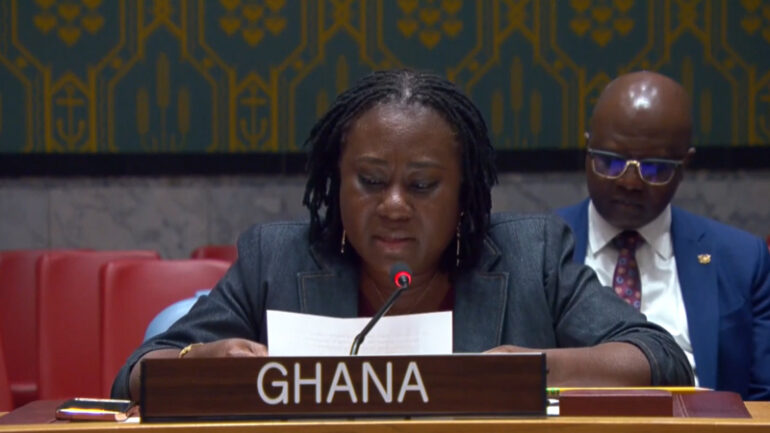United Nations Security Council: Non-proliferation/DPRK

Carolyn Oppong-Ntiri (Mrs)
Deputy Permanent Representative
Ghana Permanent Mission to the United Nations
April 18, 2023, New York City
AT AN OPEN MEETING OF THE SECURITY COUNCIL ON THE LAUNCH OF SOLID-FUEL INTERCONTINENTAL BALLISTIC MISSILE BY THE DPRK
Mr. President,
I thank ASG. Khaled Khiari for his briefing to the Council and welcome the participation of the Permanent Representative of the Republic of Korea.
Last Thursday’s test of a solid-fuel ICBM (Hwasong-18), the first by the DPRK, is yet another disturbing confirmation of the dramatic acceleration of the DPRK’s ballistic missiles programme, demonstrating the regime’s resolve to have complementarity and operational readiness for its nuclear weapon delivery systems at strategic and tactical levels.
We are gravely concerned by this unacceptable situation and firmly deplore the DPRK’s actions.
We note that the 1718 panel of experts, in its final report issued in January this year, had indicated the danger when it stated that “……the Ballistic Missiles programme (of the DPRK) have been confirmed and developed, including the improvement of the strategic forces’ command and control, the optimization of operational readiness of both solid – and liquid-propelled missile systems with increased diversity, mobility, and resilience, and the continuous improvement in the efficiency of ICBM-specific liquid and solid propellant engine”.
The DPRK’s intransigence in flouting the Council’s multiple resolutions and breaching its international law obligations, including the Non-Proliferation Treaty (NPT), jeopardises the security of the region and that of the international community. Therefore, it is important that this Council finds a common voice to indicate that such actions cannot be countenanced.
The continuation of DPRK’s nuclear weapons programme and its missile delivery systems means that the Council should reconsider its approaches to dealing with the concern through an honest discussion of how we should proceed with further actions. While doing so, we must recommit to our common objectives to achieve concrete progress in the furtherance of peace and security on the Korean peninsula.
We note the different interests that exist in relation to how the situation on the Korean Peninsula should be resolved but also note that there is a common concern to ensure that we do not have a nuclearized Peninsula.
We, therefore, urge a principled and pragmatic approach based on diplomacy, dialogue and trust-building to incrementally foster conditions that allow for constructive engagements to resolve the DPRK’s weapons programme.
In concluding, we urge all parties to undertake measures to de-escalate tensions on the Korean Peninsula. We call on the DPRK to refrain from further ballistic missile launches and comply with the Security Council’s existing demands.
It is imperative for the DPRK to cooperate with the international community towards the complete and irreversible elimination of its WMD capabilities, including its uranium enrichment and plutonium processing capabilities, in compliance with its NPT obligations as well as IAEA safeguards.
Finally, we hope that through the actions of the region and other international stakeholders, the efforts of the DPRK can be redirected towards economic development and the welfare of its people.
I thank you for your attention.
